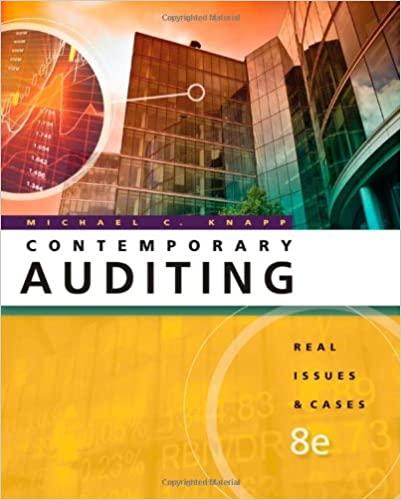As for most young professionals, earning a reasonable livelihood ranked as a top priority for Scott Fane,
Question:
As for most young professionals, earning a reasonable livelihood ranked as a top priority for Scott Fane, a CPA specializing in taxation services who relocated to Florida in the mid-1980s. To practice as a CPA in Florida, Scott registered with the Florida Board of Accountancy, which regulates the public accounting profession within the state of Florida. Scott soon butted heads with that state agency. A protracted legal battle ensued. In 1993, the young CPA and the Florida Board of Accountancy finally settled their differences in the hallowed chambers of the United States Supreme Court. Scott Fane moved to Florida from New Jersey in 1985 with the hope that Florida’s robust economy would help him quickly establish a thriving accounting practice. In New Jersey, Scott had relied on direct solicitation to identify and pursue potential clients. Although businesses commonly use direct mail, telephone calls, and in-person visitations to contact potential customers, professions historically have discouraged their members from utilizing those marketing methods. In the 1970s, the Federal Trade Commission (FTC) persuaded the American Institute of Certified Public Accountants (AICPA) to eliminate its ban on direct solicitation by AICPA members.
Most state boards quickly fell in line with the AICPA and repealed their bans on direct solicitation, including the New Jersey state board. Among the holdouts that continued to prohibit direct solicitation was the Florida state board. After moving to Florida, Scott targeted his practice development efforts on individuals and small businesses. Most of these potential customers had an ongoing relationship with a CPA. In New Jersey, Scott overcame that problem by contacting potential clients directly and offering to provide them services at fees lower than those charged by their existing CPAs. Florida’s ban on direct solicitation effectively undermined that strategy.
The rule . . . presented a serious obstacle, because most businesses are willing to rely for advice on the accountants or CPAs already serving them. In Fane’s experience, persuading a business to sever its existing accounting relations or alter them to include a new CPA on particular assignments requires the new CPA to contact the business and explain the advantages of a change. In 1990, frustration drove Scott to sue the Florida Board of Accountancy in a U.S. District Court. Scott charged that the state agency’s ban on direct solicitation was unconstitutional. Specifically, Scott alleged that the rule violated his First Amendment rights to freedom of speech.
The Florida Board of Accountancy mustered a vigorous defense to Scott Fane’s lawsuit. First, the state board maintained that the ban on direct solicitation shielded users of accounting services from zealous, “overreaching” CPAs. Second, the state board claimed that the ban safeguarded auditors’ independence, the cornerstone of the independent audit function. To bolster these arguments, the state board called on one of its former chairmen. The former state board chairman testified that CPAs who solicit clients are “obviously in need of business and may be willing to bend the rules.”3 Thus, the ban on direct solicitation allegedly prevented CPAs from falling prey to their own economic (greedy) impulses. The former chairman also testified that clients obtained via direct solicitation efforts would have considerable leverage on their CPAs. A client might use this leverage to extract concessions from a newly retained accountant. In the context of independent audits, such concessions might ultimately result in improper audit opinions and, more important, in suboptimal decisions by financial statement users relying on those opinions. The district court judge rejected the arguments made by the Florida Board of Accountancy and its former chairman. Although those arguments seemed reasonable, the judge observed that the state board had provided no concrete evidence to corroborate its claims:
The defendant [state board] has failed to demonstrate a causal relationship between in-person, direct, uninvited solicitation, and accountant misconduct. Similarly, the defendant has failed to prove any harm to third parties as a result of the alleged misconduct........
Questions
1. Review the “rules” presently included in the AICPA’s Code of Professional Conduct. In your opinion, do any of these rules improperly limit accountants’ commercial speech?
2. How may an ethical code create economic barriers of entry to a profession? Explain.
3. How may competitive bidding affect the independent audit function? Identify the potential impact on individual audit engagements and the long-range implications for the public accounting profession.
4. In a professional services context, “lowballing” refers to the practice of underpricing one’s competition to obtain clients. Identify the advantages and disadvantages of lowballing within the public accounting profession. Also identify the parties who benefi t from this practice and the parties that it harms.
5. Identify the advantages and disadvantages of professions being regulated at the state, rather than federal, level.
6. In the Scott Fane opinion, Justice O’Connor alluded to “incremental commercialization” within professions. Identify examples of incremental commercialization within the public accounting profession in recent years. How, if at all, has an increasing emphasis on the commercial aspects of public accounting affected the profession?
Step by Step Answer:

Contemporary Auditing Real Issues And Cases
ISBN: 9780538466790
8th Edition
Authors: Michael C. Knapp





